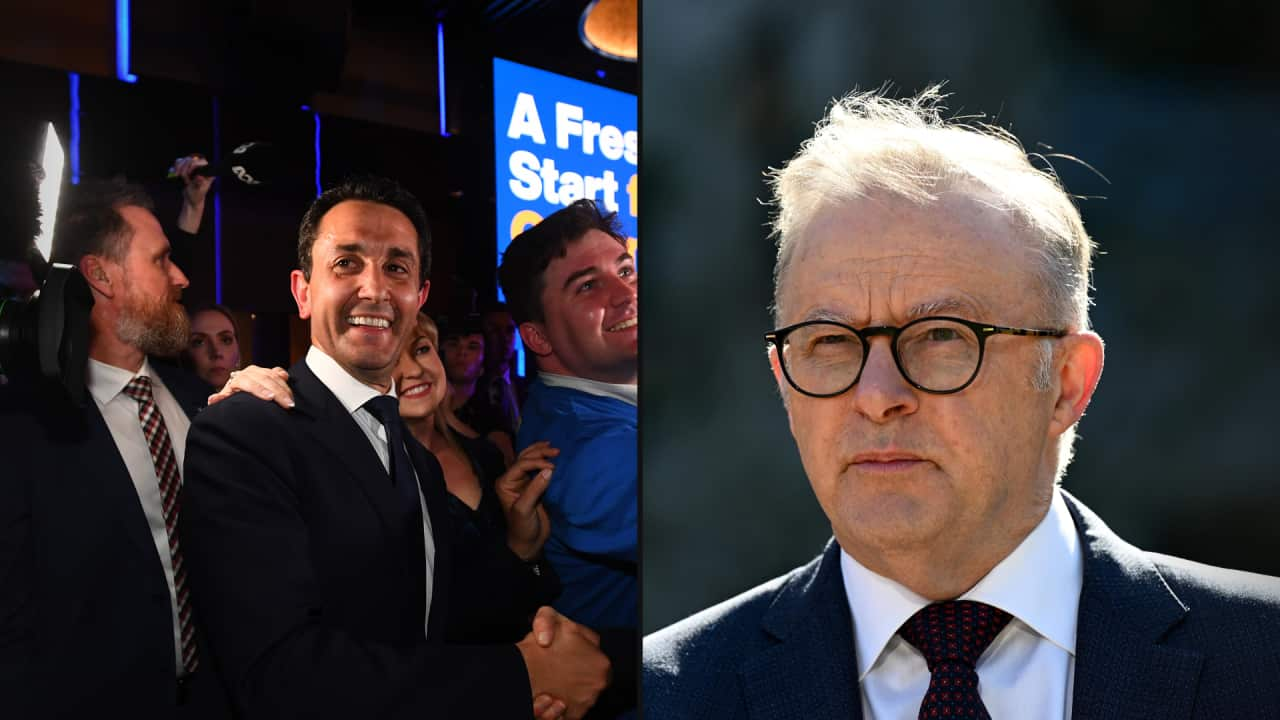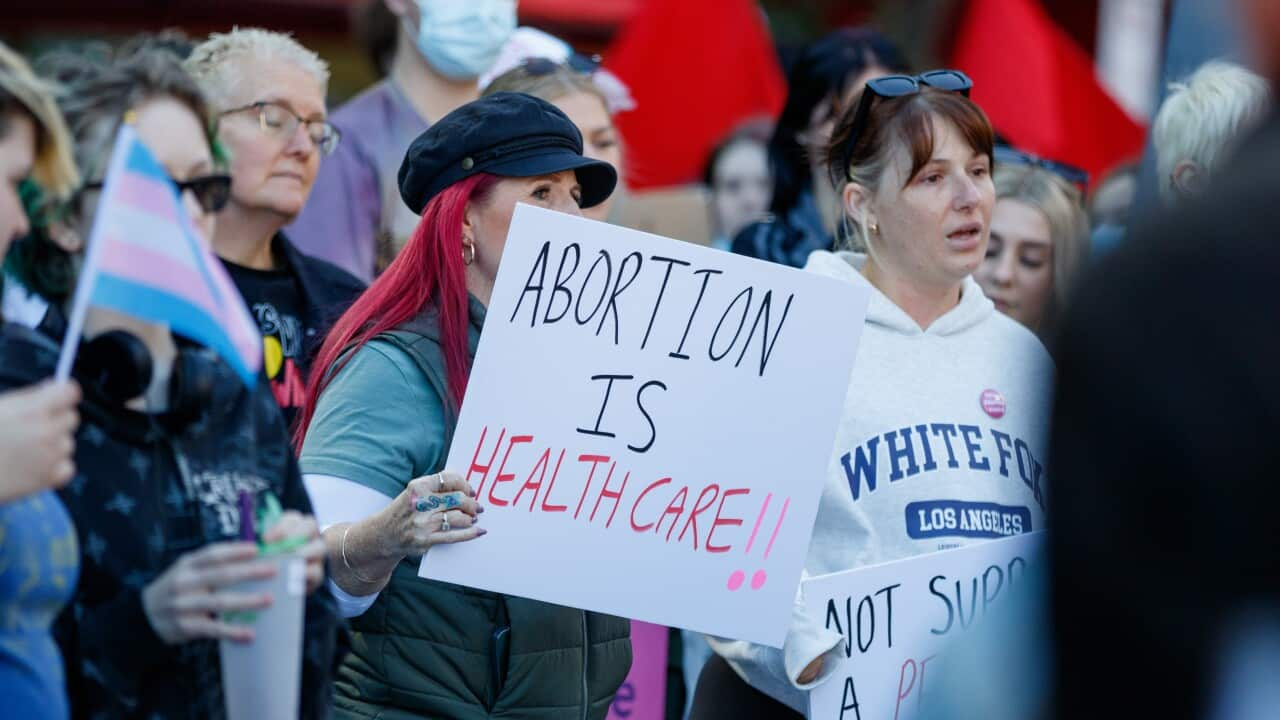David Crisafulli will become Queensland's next premier after the LNP won the state election.
But suggests Queenslanders remain divided, experts say, with the vote not reaching the landslide territory that many in the party may have hoped for.
The party needed to pick up 47 seats to secure a majority and it's projected to secure 49. Labor is on track for 30 seats, although the count is ongoing.
Some in Queensland Labor say a failure to effectively communicate how the party would tackle crime cost them votes, while others believe the LNP did not perform as well as they'd hoped due to Crisafulli's handling of .

David Crisafulli speaking at his victory party in Brisbane on Saturday night. Source: AAP / Jono Searle
Separating state and federal issues
Griffith University political scientist Paul Williams predicts the impact of the LNP win in Queensland on federal Labor's re-election chances will be limited, and he doesn't believe federal Opposition leader Peter Dutton will become prime minister.
"Queensland is very good at separating state and federal issues," he said, adding that Queenslanders helped re-elect then-prime minister Scott Morrison at the 2019 election, but then voted then Labor premier Annastacia Palaszczuk back in at the 2020 state election.
Williams said that while Queensland's track record of separating state and federal issues might give Albanese some temporary comfort, it’s likely to have a significantly influence on Labor's federal campaign strategy.
"Cost of living was and still is the number one issue," Williams said.
"If he's to take anything from this election, is that he needs to be a lot more aggressive and perhaps think about having an earlier budget — and make it a very sweet one," he said.
The next federal election is expected to be held in May 2025, with the federal budget anticipated to be handed down in March.
The primary vote for federal Labor — led by Prime Minister Anthony Albanese — has fallen below that for the Coalition since the party won the 2022 federal election, but on a two-party preferred basis they are neck and neck.
Despite labelling Queensland's outgoing Labor government — which was led by Steven Miles for the past 10 months following after eight years as the party's leader — as a "tired one", he said he was still surprised at how the sunshine state voted.
"I've analysed Australian elections since 1983, and this is one of the most unusual I've seen. It goes to show that anything can happen," he said.
Polls showed the LNP had a commanding lead Labor later in the weeks leading up to Saturday's state election, but .

Outgoing Queensland premier Steven Miles. Source: AAP / Darren England
Abortion, youth crime and loss of trust in Queensland
Speaking to ABC's Insider's program, Queensland Deputy Premier Cameron Dick said the federal government needed to do a lot of groundwork with regional voters in regaining trust, citing youth crime as a pivotal concern in the region.
"I think we have to rebuild trust," Dick said on Sunday.
"On issues like crime, I don't think that we could demonstrate to people that we were not only addressing their concerns, but we were hearing them — I think that's played out in a number of regional cities in particular," he said.
Lack of trust wasn't an issue exclusive to Queensland Labor, according to federal National Party leader David Littleproud. He said he believed the LNP lost more votes than initially anticipated due to Crisafulli’s handling of the abortion debate.
"David, on reflection, would probably prefer to have been stronger in his language – in being certain that there won’t be any changes to the laws," he told Sky News on Sunday.
Abortion emerged as one of the biggest issues in the Queensland election after state crossbencher Robbie Katter announced he would introduce a bill to repeal abortion laws before walking back his proposal to "born alive" legislation.
As the polling date drew nearer, Crisafulli was asked more than 100 times about his stance on abortion before finally clarifying he was pro-choice.
For Dutton, victory in his home state represents an opportunity to ramp up pressure on Albanese and capitalise on momentum.
Kos Samaras, the director of pollster RedBridge, said what happened in Queensland is a continuation of a national trend.
"Labor losing Rockhampton and Mackay, seats that they have held for over a hundred years ... is a problem," Samaras, who is also a former Labor campaigner, said.
Samaras said that using past trends to try to determine what may happen in the future is a risky approach, and said federal Labor ramp up its focus on tackling .
While the Miles Labor government had implemented a range of economic policy announcements such as low cost public transport and energy bill rebates, Samaras said it was "too little, too late" for low income voters, who are feeling the affordability crisis the most.
"We're going to see more and more of this sort of volatility in the federal election, particularly amongst low income constituencies," he said.
What's next?
While Queenslanders have shown support for the LNP locally, experts agree that translating that support at a federal level remains complex.
Queensland’s economic conditions, housing market pressures, and environmental concerns are likely to remain central issues, while both parties may use Queensland as an opportunity to rethink their federal strategies, one thing is clear: a focus on winning the trust of regional voters will play a critical role in the 2025 election.
With reporting by the Australian Associated Press.












